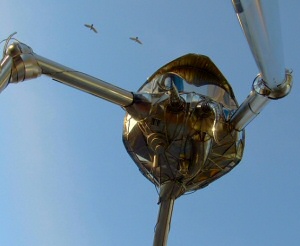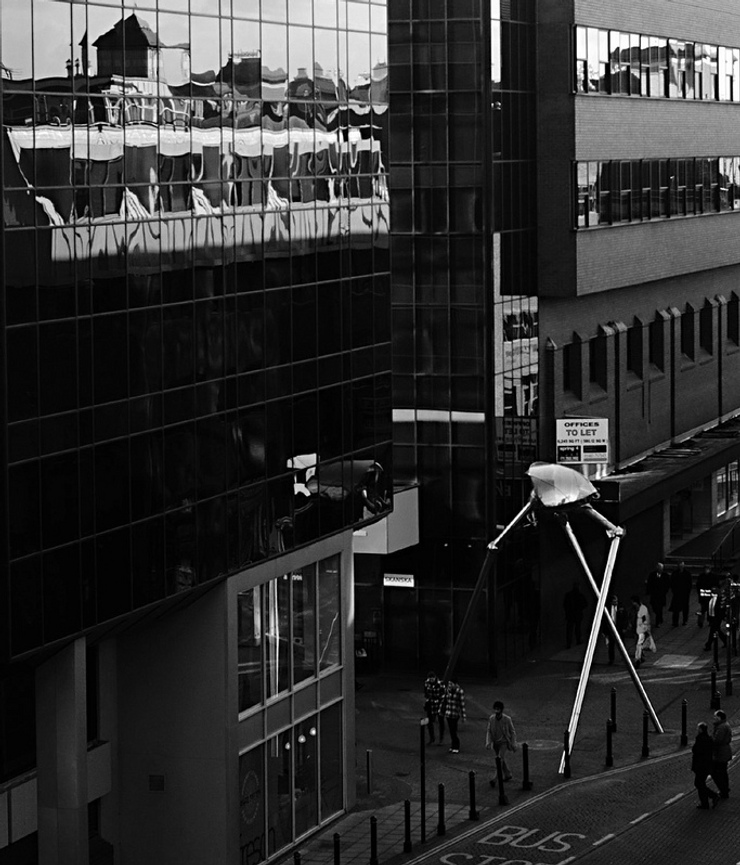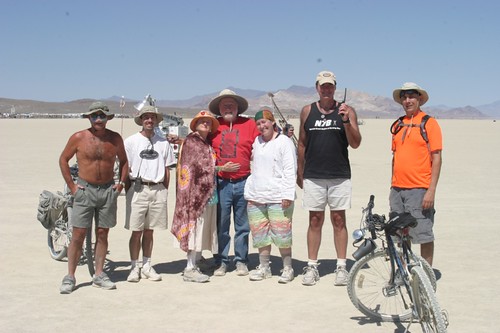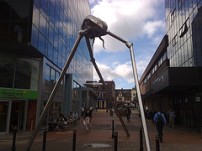Wells was an outspoken socialist and sympathetic to pacifist views, although he supported the First World War once it was under way, and his later works became increasingly political and didactic. His middle-period novels (1900–1920) were less science-fictional; they covered lower-middle class life (The History of Mr Polly) and the "New Woman" and the Suffragettes (Ann Veronica).
Herbert George Wells was born at Atlas House, 47 High Street, Bromley, in the county of Kent, a small market town, on 21 September 1866. Called "Bertie" in the family, he was the fourth and last child of Joseph Wells (a former domestic gardener, and at the time a shopkeeper and professional cricketer) and his wife Sarah Neal (a former domestic servant). The family was of the impoverished lower middle class. An inheritance had allowed the family to acquire a shop in which they sold china and sporting goods, although it failed to prosper: the stock was old and worn out, and the location was poor. Joseph Wells managed to earn a meagre income, but little of it came from the shop; Joseph received an unsteady amount of money from playing professional cricket for the Kent county team. Payment for skilled bowlers and batsmen came from voluntary donations afterwards, or from small payments from the clubs where matches were played.
A defining incident of young Wells's life was an accident he had in 1874, which left him bedridden with a broken leg. To pass the time he started reading books from the local library, brought to him by his father. He soon became devoted to the other worlds and lives to which books gave him access; they also stimulated his desire to write. Later that year he entered Thomas Morley's Commercial Academy, a private school founded in 1849 following the bankruptcy of Morley's earlier school. The teaching was erratic, the curriculum mostly focused, Wells later said, on producing copperplate handwriting and doing the sort of sums useful to tradesmen. Wells continued at Morley's Academy until 1880. In 1877, his father, Joseph Wells, fractured his thigh. The accident effectively put an end to Joseph's career as a cricketer, and his subsequent earnings as a shopkeeper were not enough to compensate for the loss of the primary source of family income.
No longer able to support themselves financially, the family instead sought to place their sons as apprentices in various occupations. From 1880 to 1883, Wells had an unhappy apprenticeship as a draper at the Southsea Drapery Emporium, Hyde's. His experiences at Hyde's, where he worked a thirteen hour day and slept in a dormitory with other apprentices, were later used as inspiration for some of his novel material The Wheels of Chance and Kipps, which delve into the life of a draper's apprentice as well as providing a critique of the world's distribution of wealth.
Herbert's parents' marriage was a turbulent relationship: due primarily to his mother being a Protestant and his father a self-confessed freethinker. When his mother returned to work as a lady's maid (at Uppark, a country house in Sussex), one of the conditions of work was that she would not be permitted to have living space for her husband and children. Thereafter, she and Joseph lived separate lives: though they never divorced and neither ever developed extramarital liaisons. As a consequence, Herbert's personal troubles increased as he subsequently failed as a draper and also, later, as a chemist's assistant. After each failure, he would arrive at Uppark — "the bad shilling back again!" as he said — and stay there until a fresh start could be arranged for him. Fortunately for Herbert, Uppark had a magnificent library in which he immersed himself, reading many classic works, including Plato's Republic, and More's Utopia. This would be the beginning of Herbert George Wells's venture into literature.
In October 1879 Wells's mother arranged through a distant relative, Arthur Williams, for him to join the National School at Wookey in Somerset as a pupil-teacher, a senior pupil who acted as a teacher of younger children. In December that year, however, Williams was dismissed for irregularities in his qualifications and Wells was returned to Uppark. After a short apprenticeship at a chemist in nearby Midhurst, and an even shorter stay as a boarder at Midhurst Grammar School, he signed his apprenticeship papers at Hyde's. In 1883 Wells persuaded his parents to release him from the apprenticeship, taking an opportunity offered by Midhurst Grammar School again to become a pupil-teacher; his proficiency in Latin and science during his previous, short stay had been remembered.
The years he spent in Southsea had been the most miserable of his life to that point, but his good fortune at securing a position at Midhurst Grammar School meant that Wells could continue his self-education in earnest. The following year, Wells won a scholarship to the Normal School of Science (later the Royal College of Science in South Kensington, now part of Imperial College London) in London, studying biology under Thomas Henry Huxley. As an alumnus, he later helped to set up the Royal College of Science Association, of which he became the first president in 1909. Wells studied in his new school until 1887 with a weekly allowance of twenty-one shillings (a guinea) thanks to his scholarship. This ought to have been a comfortable sum of money (at the time many working class families had "round about a pound a week" as their entire household income) yet in his Experiment in Autobiography, Wells speaks of constantly being hungry, and indeed, photographs of him at the time show a youth very thin and malnourished.
He soon entered the Debating Society of the school. These years mark the beginning of his interest in a possible reformation of society. At first approaching the subject through The Republic by Plato, he soon turned to contemporary ideas of socialism as expressed by the recently formed Fabian Society and free lectures delivered at Kelmscott House, the home of William Morris. He was also among the founders of The Science School Journal, a school magazine which allowed him to express his views on literature and society, as well as trying his hand at fiction: the first version of his novel The Time Machine was published in the journal under the title, The Chronic Argonauts. The school year 1886–1887 was the last year of his studies. In spite of having previously successfully passed his exams in both biology and physics, his lack of interest in geology resulted in his failure to pass and the subsequent loss of his scholarship. It was not until 1890 that Wells earned a Bachelor of Science degree in zoology from the University of London External Programme. In 1889–90 he managed to find a post as a teacher at Henley House School where he taught and admired A. A. Milne. Upon leaving the Normal School of Science, Wells was left without a source of income. His aunt Mary—his father's sister-in-law—invited him to stay with her for a while, which solved his immediate problem of accommodation. During his stay at his aunt's residence, he grew increasingly interested in her daughter, Isabel. He would later go on to court her.
Herbert George Wells was born at Atlas House, 47 High Street, Bromley, in the county of Kent, a small market town, on 21 September 1866. Called "Bertie" in the family, he was the fourth and last child of Joseph Wells (a former domestic gardener, and at the time a shopkeeper and professional cricketer) and his wife Sarah Neal (a former domestic servant). The family was of the impoverished lower middle class. An inheritance had allowed the family to acquire a shop in which they sold china and sporting goods, although it failed to prosper: the stock was old and worn out, and the location was poor. Joseph Wells managed to earn a meagre income, but little of it came from the shop; Joseph received an unsteady amount of money from playing professional cricket for the Kent county team. Payment for skilled bowlers and batsmen came from voluntary donations afterwards, or from small payments from the clubs where matches were played.
A defining incident of young Wells's life was an accident he had in 1874, which left him bedridden with a broken leg. To pass the time he started reading books from the local library, brought to him by his father. He soon became devoted to the other worlds and lives to which books gave him access; they also stimulated his desire to write. Later that year he entered Thomas Morley's Commercial Academy, a private school founded in 1849 following the bankruptcy of Morley's earlier school. The teaching was erratic, the curriculum mostly focused, Wells later said, on producing copperplate handwriting and doing the sort of sums useful to tradesmen. Wells continued at Morley's Academy until 1880. In 1877, his father, Joseph Wells, fractured his thigh. The accident effectively put an end to Joseph's career as a cricketer, and his subsequent earnings as a shopkeeper were not enough to compensate for the loss of the primary source of family income.
No longer able to support themselves financially, the family instead sought to place their sons as apprentices in various occupations. From 1880 to 1883, Wells had an unhappy apprenticeship as a draper at the Southsea Drapery Emporium, Hyde's. His experiences at Hyde's, where he worked a thirteen hour day and slept in a dormitory with other apprentices, were later used as inspiration for some of his novel material The Wheels of Chance and Kipps, which delve into the life of a draper's apprentice as well as providing a critique of the world's distribution of wealth.
 Incredible Tripod Sculpture |  H. G. Wells War of the Worlds |  The Woking Martian sculpture |  a statue of the tripod. |  a statue of the tripod. |
 tripods from The War | File:Woking tripod. |  by War of the Worlds, |  war of the worlds |  The War of the Worlds 70th |
The years he spent in Southsea had been the most miserable of his life to that point, but his good fortune at securing a position at Midhurst Grammar School meant that Wells could continue his self-education in earnest. The following year, Wells won a scholarship to the Normal School of Science (later the Royal College of Science in South Kensington, now part of Imperial College London) in London, studying biology under Thomas Henry Huxley. As an alumnus, he later helped to set up the Royal College of Science Association, of which he became the first president in 1909. Wells studied in his new school until 1887 with a weekly allowance of twenty-one shillings (a guinea) thanks to his scholarship. This ought to have been a comfortable sum of money (at the time many working class families had "round about a pound a week" as their entire household income) yet in his Experiment in Autobiography, Wells speaks of constantly being hungry, and indeed, photographs of him at the time show a youth very thin and malnourished.
Archivo:Statue of Tripod.JPG |  to War of the Worlds, |  Project: War of the Worlds |  "War of the Worlds" statue |  of the tripod is amazing. |
 Tripod, War of the Worlds |  Image of Monument to the War |  a statue of the tripod. |  Maquinas de Guerra |  Martian tripod sculpture |
No comments:
Post a Comment